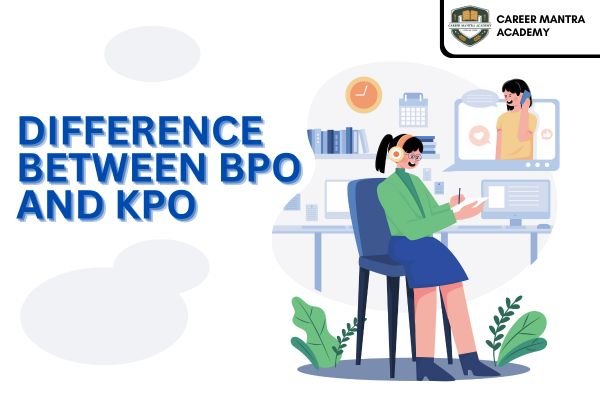Why You Choose BPO? A Best Complete Guide for Freshers and Job Seekers in 2026
Why You Choose BPO For Applying BPO Course Click Here… What Is BPO (Business Process Outsourcing) and How Does It Work? BPO (Business Process Outsourcing) refers to the practice of outsourcing certain business operations to third-party service providers. These processes help organizations save time, reduce costs, and focus on their core activities. How Does BPO Work? In simple terms, BPO acts as a support system for businesses, ensuring smooth operations while creating large-scale employment opportunities, especially for freshers and graduates. Why Should You Choose BPO as a Career? Choosing BPO (Business Process Outsourcing) as a career can be a smart option for students, freshers, and career switchers looking for quick employment and growth. The BPO (Business Process Outsourcing) industry offers diverse roles and a dynamic work environment with global exposure. Why Should You Choose BPO as a Career? BPO jobs help build confidence and professional experience at an early stage. With proper training and dedication, candidates can grow rapidly and secure a stable and rewarding career in the outsourcing industry. What Are the Main Benefits of Working in the BPO Industry? Working in the BPO (Business Process Outsourcing) industry offers multiple benefits, especially for freshers and young professionals who want fast career entry and growth. Below are the main advantages explained in points: Why Is BPO a Popular Career Choice for Freshers? BPO is a popular career choice for freshers because it offers quick employment opportunities with minimal experience requirements. Many BPO (Business Process Outsourcing) companies provide training programs, making it easier for beginners to adapt to the work environment. Freshers can start earning early while developing communication, customer service, and professional skills. The industry also offers flexible shifts, which suit students and recent graduates. Additionally, BPO jobs provide career growth opportunities, allowing freshers to move into senior roles within a short time. This combination of easy entry, skill development, and growth makes BPO an attractive option for freshers. What Skills Can You Learn by Working in BPO? Working in the BPO industry helps you develop a wide range of professional and personal skills that are valuable in any career. Below are the key skills you can learn while working in BPO: Professional etiquette: Improves workplace discipline, confidence, and corporate behavior. These skills not only support growth within the BPO sector but also open doors to opportunities in other industries. How Does BPO Help in Career Growth and Promotion? What Salary and Incentives Can You Expect in BPO Jobs? Job Role Experience Level Average Monthly Salary (₹) Incentives & Benefits Customer Service Executive Fresher ₹12,000 – ₹20,000 Performance incentives, night shift allowance Senior Executive 1–2 Years ₹18,000 – ₹28,000 Target-based bonuses, attendance rewards Team Leader 2–4 Years ₹30,000 – ₹45,000 Team performance incentives, leadership bonus Quality Analyst 2–4 Years ₹28,000 – ₹40,000 Quality-based incentives, appraisal benefits Process Trainer 3–5 Years ₹30,000 – ₹45,000 Training incentives, skill-based bonuses Operations Manager 5+ Years ₹50,000 – ₹80,000+ High-performance bonuses, annual rewards BPO Interview Questions With Sample Answers: Preparing for a BPO (Business Process Outsourcing) interview requires confidence, clear communication, and basic knowledge about customer service and the industry. Below are commonly asked BPO interview questions with sample answers to help freshers and job seekers prepare effectively. 1. What is BPO? Sample Answer: BPO (Business Process Outsourcing) stands for Business Process Outsourcing. It is a process where companies outsource non-core business activities such as customer support, data entry, payroll, and technical support to third-party service providers. This helps companies reduce costs and focus on their core business operations. 2. Why do you want to work in the BPO industry? Sample Answer: I want to work in the BPO (Business Process Outsourcing) industry because it offers great learning opportunities, skill development, and career growth. It helps improve communication and customer-handling skills while providing exposure to a professional and global work environment. 3. Why should we hire you for this BPO role? Sample Answer: You should hire me because I have good communication skills, a positive attitude, and the ability to handle customers patiently. I am eager to learn, adaptable to shifts, and committed to delivering quality service to customers. 4. What do you know about our company? Sample Answer: Your company is a reputed BPO (Business Process Outsourcing) organization known for delivering quality customer support services. It has a strong presence in the industry and focuses on employee training, customer satisfaction, and process excellence. 5. Are you comfortable working on night shifts or rotational shifts? Sample Answer: Yes, I am comfortable working on night shifts and rotational shifts. I understand that BPO (Business Process Outsourcing) operations serve global clients, and I am flexible with work timings to meet business requirements. 6. How will you handle an angry or upset customer? Sample Answer: I will first listen carefully to the customer without interrupting, stay calm, and show empathy. I will apologize for the inconvenience, understand the issue clearly, and provide the best possible solution or escalate it if required. 7. What are your strengths? Sample Answer: My strengths include good communication skills, patience, problem-solving ability, and a positive attitude. I can handle pressure well and focus on delivering quality service to customers. 8. What are your weaknesses? Sample Answer: Sometimes I focus too much on completing tasks perfectly, which may take extra time. However, I am learning to balance accuracy with efficiency and improve my time management skills. 9. What does customer service mean to you? Sample Answer: Customer service means understanding customer needs, resolving their issues effectively, and ensuring customer satisfaction. It also involves clear communication, empathy, and professionalism. 10. How do you handle work pressure or stress? Sample Answer: I handle work pressure by staying calm, prioritizing tasks, and focusing on solutions. Taking short breaks and maintaining a positive mindset also help me manage stress effectively. 11. Can you work in a team? Sample Answer: Yes, I enjoy working in a team. Teamwork helps in sharing knowledge, solving problems faster, and achieving common goals efficiently. 12. What is the difference between inbound and










